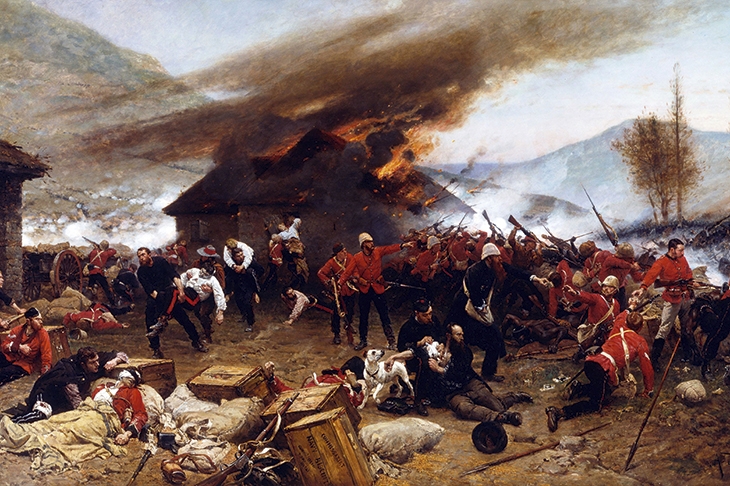On 22 January last year, the entrance whiteboard at London Underground’s Dollis Hill carried a brief factual statement:
On this day in history
On the 22–23 January 1879 in Natal, South Africa, a small British garrison named Rorke’s Drift was attacked by 4,000 Zulu warriors. The garrison was successfully defended by just over 150 British and colonial troops. Following the battle, 11 men were awarded the Victoria Cross.
A female passenger complained that it was ‘celebrating colonialism’. The board was wiped clean and a suitably opaque quote from Martin Luther King substituted: ‘We are not the makers of history. We are made by history.’
Too late to avoid the Twitter storm, however, whipped to fury by the pop singer Lily Allen who, according to her Wikipedia entry, ‘left school when she was 15 to concentrate on improving her performing and compositional skills’ (which include the memorable number ‘Fuck You’). She reportedly declared the whiteboard ‘disgusting’, TFL quickly apologised:
Our staff across the network share messages on these boards, but in this instance the message was clearly ill-judged. We are speaking with our staff to remind them of what is and isn’t acceptable.
Professor Ian Beckett, one of the most respected historians of the British army, tells this story in the conclusion of the latest volume of the OUP’s ‘Great Battles’ series. It illustrates the problem of communicating facts to a public increasingly prone to interpreting history in terms of the present, and apparently unable to celebrate bravery for what it is.
It also, perhaps, shows what a problem the British army has in its efforts to be inclusive, for a survey by the British Forces Broadcasting Service in 2008 revealed Zulu (1964) to be the most popular film of all time among servicemen. In Afghanistan there were frequent allusions to Rorke’s Drift: the defenders of isolated posts in Helmand were determined not to give way there either.
Indeed, there is a good deal in this book about the cultural context and impact of Rorke’s Drift, and of its calamitous prelude Isandlwana, in which 710 British regulars were killed, mainly from the same regiment (the 24th Foot, the 2nd Warwickshires, redesignated in 1881 the South Wales Borderers), and some 500 local auxiliaries. It was the greatest loss in a single day between Waterloo and the first world war.
In 1877 the British had annexed Transvaal to resolve the continuing border dispute between the Boers and the Zulus. The new high commissioner, Sir Bartle Frere, decided that the Zulu army needed reducing. But the Zulu were unlike any enemy the British army had faced — 40,000 formidably brave warriors — and death awaited any who faltered. Their impis (regiments) could move across country at a steady jog-trot for days on end. They attacked in ‘horns of the buffalo’ formation, fronting with a paralysing mass of spearmen — the head or breast of the buffalo — with others sweeping round both flanks like the horns to prevent escape. To defeat them, firepower was everything. To be caught off balance meant certain destruction.
The military commander in South Africa was Lieutenant-General Lord Chelmsford, an experienced soldier who had recently brought to a successful end yet another Cape frontier war with the Xhosa. In January 1879 he marched into Zululand with 17,000 British and native troops in five columns. The centre column, 5,000 strong, with Chelmsford at their head, began crossing the Buffalo River at Rorke’s Drift on 11 January, leaving a company of the 24th to guard the crossing, and ten days later they were encamped on the plain of Isandlwana. Fatally, they did not dig in; nor did they, on Chelmsford’s orders, leaguer the wagons. The following day they were caught off guard, and their firepower failed them.
Much has been made of this firepower failure. After all, the Zulu were mostly armed with spears, and the 24th’s new Martini-Henry rifle, the first breech-loader (single shot), was judged the best in the world. Even more has been made of the supposed inability to get the ammunition boxes open. In the routine of peace this required a screwdriver, but in action, when no one was concerned about recovering the box for subsequent use, it needed just a sharp blow with the rifle butt. Beckett dismisses the various excuses, which he sees as the usual search for a technical explanation to mask a straightforward tactical military cockup. Besides, he points out, it belies the Zulus’ sheer skill and courage
Does he dismiss a little too readily, though, the problem of smoke from the Martini-Henry’s black-powder cartridge? There wasn’t a breath of wind that day, and the volleying — or, as Beckett suggests, individual fire begun (improbably, I believe) at extreme range of 800 yards — would have built up such a smoke screen as to slow down the rate of fire. Survivors don’t mention it much. But only a few hundred got away from Isandlwana, and none from the actual firing lines. The War Office soon began pressing for smokeless powder.
Be what may, honour was saved later that day by the skill and bravery of that single company at Rorke’s Drift. And thus a desperate brawl at a mission station is up there with the great battle honours of the British army.
Professor Beckett’s concise account of these twin actions is a model of readable military history.






Comments